Deividas Mataciunas
Bridging the Data Provenance Gap Across Text, Speech and Video
Dec 19, 2024



Abstract:Progress in AI is driven largely by the scale and quality of training data. Despite this, there is a deficit of empirical analysis examining the attributes of well-established datasets beyond text. In this work we conduct the largest and first-of-its-kind longitudinal audit across modalities--popular text, speech, and video datasets--from their detailed sourcing trends and use restrictions to their geographical and linguistic representation. Our manual analysis covers nearly 4000 public datasets between 1990-2024, spanning 608 languages, 798 sources, 659 organizations, and 67 countries. We find that multimodal machine learning applications have overwhelmingly turned to web-crawled, synthetic, and social media platforms, such as YouTube, for their training sets, eclipsing all other sources since 2019. Secondly, tracing the chain of dataset derivations we find that while less than 33% of datasets are restrictively licensed, over 80% of the source content in widely-used text, speech, and video datasets, carry non-commercial restrictions. Finally, counter to the rising number of languages and geographies represented in public AI training datasets, our audit demonstrates measures of relative geographical and multilingual representation have failed to significantly improve their coverage since 2013. We believe the breadth of our audit enables us to empirically examine trends in data sourcing, restrictions, and Western-centricity at an ecosystem-level, and that visibility into these questions are essential to progress in responsible AI. As a contribution to ongoing improvements in dataset transparency and responsible use, we release our entire multimodal audit, allowing practitioners to trace data provenance across text, speech, and video.
Consent in Crisis: The Rapid Decline of the AI Data Commons
Jul 24, 2024


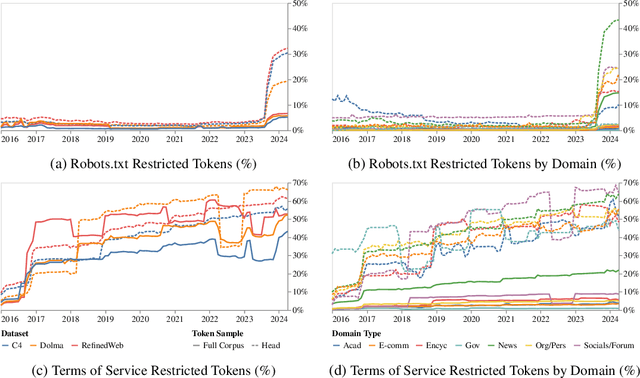
Abstract:General-purpose artificial intelligence (AI) systems are built on massive swathes of public web data, assembled into corpora such as C4, RefinedWeb, and Dolma. To our knowledge, we conduct the first, large-scale, longitudinal audit of the consent protocols for the web domains underlying AI training corpora. Our audit of 14,000 web domains provides an expansive view of crawlable web data and how codified data use preferences are changing over time. We observe a proliferation of AI-specific clauses to limit use, acute differences in restrictions on AI developers, as well as general inconsistencies between websites' expressed intentions in their Terms of Service and their robots.txt. We diagnose these as symptoms of ineffective web protocols, not designed to cope with the widespread re-purposing of the internet for AI. Our longitudinal analyses show that in a single year (2023-2024) there has been a rapid crescendo of data restrictions from web sources, rendering ~5%+ of all tokens in C4, or 28%+ of the most actively maintained, critical sources in C4, fully restricted from use. For Terms of Service crawling restrictions, a full 45% of C4 is now restricted. If respected or enforced, these restrictions are rapidly biasing the diversity, freshness, and scaling laws for general-purpose AI systems. We hope to illustrate the emerging crises in data consent, for both developers and creators. The foreclosure of much of the open web will impact not only commercial AI, but also non-commercial AI and academic research.
Aya Dataset: An Open-Access Collection for Multilingual Instruction Tuning
Feb 09, 2024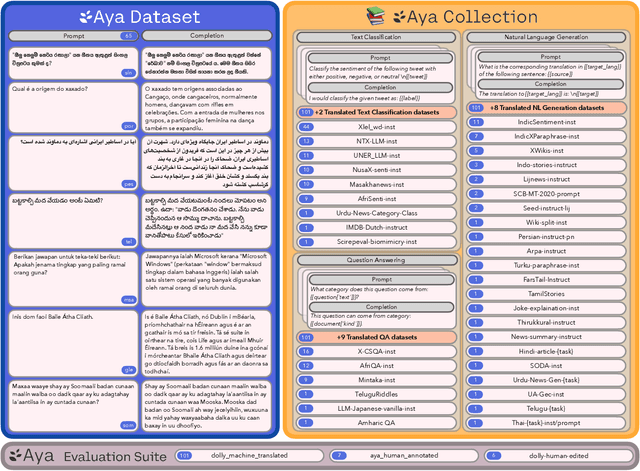
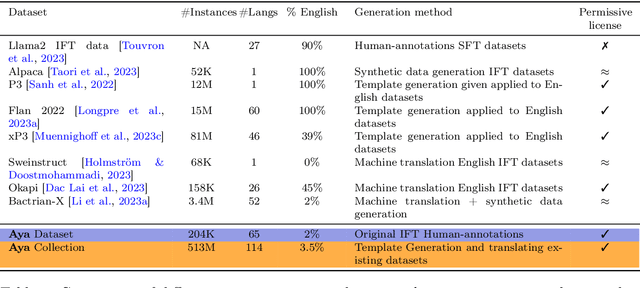
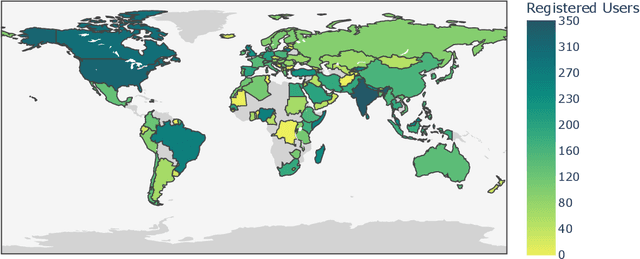
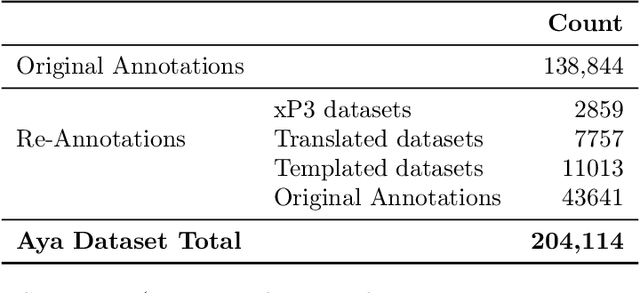
Abstract:Datasets are foundational to many breakthroughs in modern artificial intelligence. Many recent achievements in the space of natural language processing (NLP) can be attributed to the finetuning of pre-trained models on a diverse set of tasks that enables a large language model (LLM) to respond to instructions. Instruction fine-tuning (IFT) requires specifically constructed and annotated datasets. However, existing datasets are almost all in the English language. In this work, our primary goal is to bridge the language gap by building a human-curated instruction-following dataset spanning 65 languages. We worked with fluent speakers of languages from around the world to collect natural instances of instructions and completions. Furthermore, we create the most extensive multilingual collection to date, comprising 513 million instances through templating and translating existing datasets across 114 languages. In total, we contribute four key resources: we develop and open-source the Aya Annotation Platform, the Aya Dataset, the Aya Collection, and the Aya Evaluation Suite. The Aya initiative also serves as a valuable case study in participatory research, involving collaborators from 119 countries. We see this as a valuable framework for future research collaborations that aim to bridge gaps in resources.
 Add to Chrome
Add to Chrome Add to Firefox
Add to Firefox Add to Edge
Add to Edge